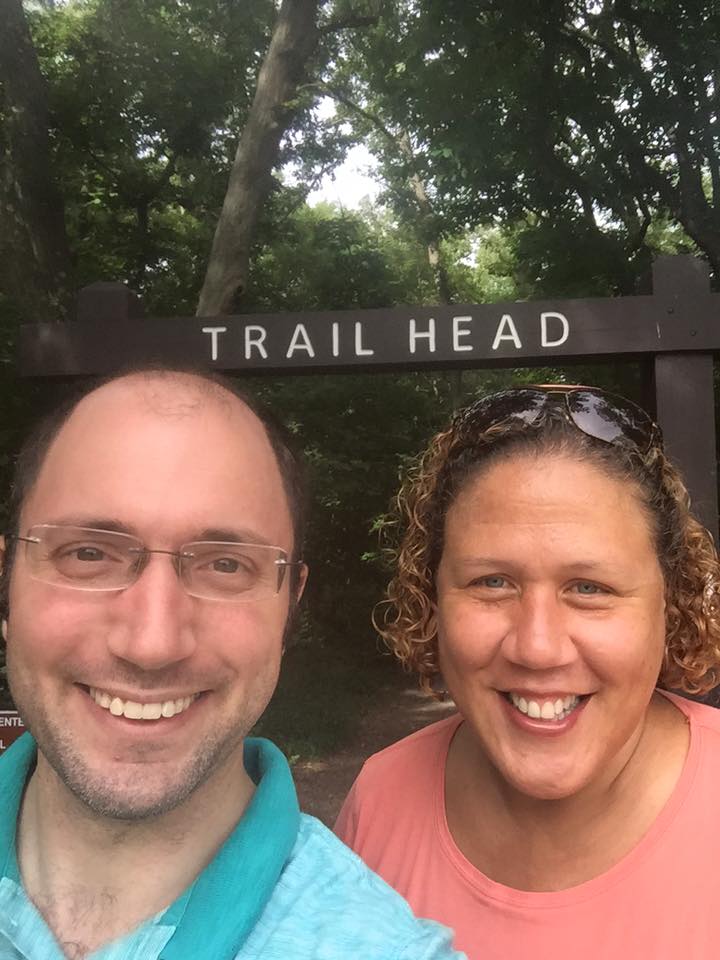
Rabbi Ari Saks has been at Congregation Beth Mordecai in Perth Amboy, New Jersey, since the summer of 2012, following his graduation from JTS. Like probably most of his peers he was faced right out of rabbinical school with the complex issues of interfaith families in our congregations but he did have some prior experience in this area as the result of teaching for The Interfaith Community, a Manhattan based program for families raising children in two religious traditions. Thanks to the proximity of St. Peter’s Episcopal Church - just down the street from Beth Mordecai – Ari quickly connected with their rector, Reverend Anne-Marie Jeffery so that his interfaith work could continue. Their first joint effort was an interfaith volunteer program rebuilding homes on Staten Island after the devastation of Hurricane Sandy in the Fall of 2012. Building on that experience Rabbi Saks and Reverend Jeffery created an interfaith couples seminar, a program for couples who had decided to raise their children in both the Jewish and Christian traditions, couples who are not often served by the Conservative movement. The program was designed to embrace - without judgment - both the opportunities and challenges that were likely to emerge in working with families who chose to raise their children with both Judaism and Christianity. But after the initial two sessions, including one built around text study, Ari felt that something was missing. “I didn’t feel comfortable promoting this program to the entire community,” he said. “It was only focused on a small segment of the larger demographic of interfaith families. I wanted to serve that whole segment, I just wasn’t sure how to do that.” So Ari and Reverend Jeffery decided to put the program on hold until they figured out what to do.
During that year, Ari found himself confronted within his own congregation with the complications faced by families dealing with different faiths in their backgrounds: a bar mitzvah for the child of a father who was not Jewish; a couple impacted by the former faith of the partner who had converted; the aufrufs and baby namings of interfaith couples raising their children in the Jewish tradition exclusively but wanting to recognize both faiths with an appropriate ritual. In the case of naming the child of a Jewish mother and Catholic father, the father marked the way faith is expressed in his family by reading a passage from the Catholic tradition, using his own Bible. Ari describes his goal as “allowing all permutations to exist in the same community while infusing as much Yiddishkeit as I can into the different options that present themselves; each presents a unique challenge and also an opening to a conversation that we might not be able to have if we require only one particular approach”.
Focusing on Issues of Faith
These experiences helped inform the conversations Ari had with Reverend Jeffery when they took a retreat together to a local park in New Jersey (see picture attached). During this retreat, they focused much of their conversation on what faith means for these mixed couples; rather than focusing on just couples who decide to raise their children with both traditions, they asked “what if we just opened it up to the various ways in which faith can show itself in the family life of a couple who come from different faith backgrounds?” This new version of the seminar, called “Faithful Families” would be an open forum for conversations about faith, providing space for couples with different faith backgrounds to foster their spiritual journeys by exposure to a wide array of perspectives without feeling any pressure about their particular religious practice. This iteration of Faithful Families allows for an exploration of how faith based communities can leverage their unique faith experiences to foster spiritual journeys.
Ari describes a recent weekend in Perth Amboy with a session of Faithful Families in its new formulation, followed by a meeting of the Jewish Outreach Institute’s “Grandparents Circle”, a program of “Big Tent Judaism” focused on how to relate to grandkids who are being raised in various ways by interfaith couples. He has seen how a range of permutations is critically important for interfaith families since “there’s a lot of pressure that’s either explicitly shared or implicitly there and couples don’t know how to process it which often leads couples to decide it’s best not to do anything.” Consequently, says Ari, “you need to be willing to engage in difficult conversations in order to identify what couples want rather than choose that path of least resistance.” Perhaps these conversations will eventually begin to happen in the Faithful Families group but, in the meantime, it is the “human need to deal with God” that will be the impetus for that group where “the human response to the religious call is reflected in having different traditions in the same space.” Having such conversations can not only strengthen faith but also work against the intolerance and fanaticism that often results from people “compartmentalizing differences” and maintaining their particularistic view if they are in spaces where they don’t have to discuss these differences.
So these days in Perth Amboy, New Jersey, the challenges of interfaith families so familiar in our congregations are faced with an open-minded ingenuity, while Christian and Jewish couples wrestle with issues of faith in a group led by Rabbi Saks and Reverend Jeffery.
